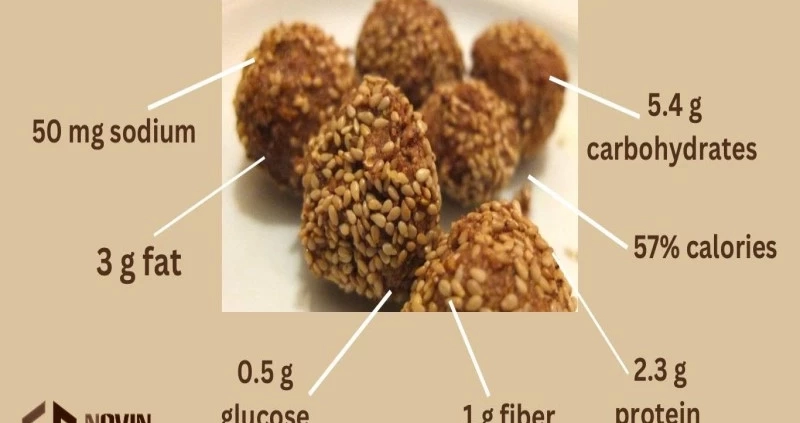Falafel Nutrition Facts
Falafel is a popular Middle Eastern dish made from ground chickpeas or fava beans, mixed with herbs and spices, and then formed into patties or balls and deep-fried. While it may not be the healthiest option, falafel can be a nutritious and satisfying meal for vegetarians, athletes, and people on a diet. In this article from ‘Novin Sanat’, we will explore falafel nutrition and why it is important for these groups to know about its nutritional content.
What are Falafel nutrition facts?
According to Healthline, a 3.5-ounce serving of falafel contains
- 333 calories,
- 10 grams of fat,
- 41 grams of carbohydrates,
- and 13 grams of protein.
falafel is also a good source of fiber, with 6 grams per serving.
Additionally, falafel nutrition contains a variety of important vitamins and minerals, including
- vitamin A,
- vitamin C,
- vitamin E,
- vitamin K,
- calcium,
- iron,
- magnesium,
- phosphorus,
- potassium,
- and zinc.
A 100-gram serving of falafel contains 585 milligrams of potassium, which is 17% of the daily value.
Falafel also contains 10 grams of monounsaturated fat, which is a healthy type of fat that can help lower cholesterol levels.
The glycemic index of falafel is 33, which means it can cause a moderate spike in blood sugar levels.
A 17-gram serving of falafel contains 0.9 grams of saturated fat and 0 milligrams of cholesterol. Falafel also contains 2.04 micrograms of vitamin A, 1.3 milligrams of vitamin C, 0.00 milligrams of vitamin D, 0.38 milligrams of iron, 14.62 milligrams of calcium, and 44 milligrams of potassium.
Types of falafel machines of Novin Sanat Company
Falafel nutrition and Health Benefits
Falafel has several health benefits that make it a great option for vegetarians, athletes, and people on diet.
High in Protein
Falafel is a good source of protein, which is important for building and repairing muscle tissue. It is also a complete protein, meaning it contains all nine essential amino acids that the body needs to function properly.
Rich in Fiber
Falafel is high in fiber, which helps regulate digestion and promotes a healthy gut microbiome. Fiber also helps lower cholesterol levels and reduce the risk of chronic diseases
Low in Saturated Fat
Falafel is low in saturated fat, which is associated with an increased risk of heart disease and other chronic diseases. By choosing falafel over other high-fat options, such as meat or cheese, you can reduce your saturated fat intake and improve your overall health.
Gluten-Free
Falafel is gluten-free, making it a great option for people with celiac disease or gluten intolerance. It is also a good option for those following a vegan or vegetarian diet, as it is made from plant-based ingredients.
Falafel Nutrition, Why Vegetarians Should Know About?
For vegetarians, falafel can be a valuable source of protein and other essential nutrients. Chickpeas, which are the main ingredient in falafel, are high in protein and fiber, making them an excellent choice for vegetarians who are looking to increase their protein intake.
Falafel is also a good source of vitamins and minerals, such as vitamin A, vitamin C, calcium, iron, magnesium, phosphorus, and potassium.
Falafel Nutrition, Why Athletes Should Know About?
For athletes, falafel can be a convenient and nutritious option for post-workout meals. ‘falafel nutrition’ is high in protein, which is essential for muscle growth and repair.
Additionally, falafel is low in fat and contains complex carbohydrates, which can provide energy for workouts. Falafel is also a good source of fiber, which can help with digestion and prevent constipation.
Falafel Nutrition, Why People on a Diet Should Know About?
For people on a diet, falafel can be a valuable tool for weight loss. falafel nutrition is low in fat and contains complex carbohydrates, which can help with weight loss.
Additionally, falafel is a good source of protein, which can help with muscle growth and repair. Falafel is also a good source of fiber, which can help with digestion and prevent constipation.
How many calories should you take?
You should know that, it is not recommended to consume a daily caloric intake of 1200 calories for weight loss or overall health.
This is because 1200 calories is considered a very low calorie diet, and it may not provide enough energy for the body to function properly.
Additionally, consuming too few calories can lead to nutrient deficiencies and other health problems.
The recommended daily caloric intake for weight loss varies depending on factors such as age, sex, weight, and activity level.
A safe and sustainable rate of weight loss is typically considered to be 1-2 pounds per week, which can be achieved by creating a calorie deficit of 500-1000 calories per day through a combination of diet and exercise.
It is important to note that the optimal caloric intake for weight loss is not a one-size-fits-all solution, and it is best to consult with a healthcare professional or registered dietitian to determine the appropriate caloric intake for individual needs and goals.
Conclusion
In conclusion, falafel is a nutritious and satisfying meal option for vegetarians, athletes, and people on a diet. It is a good source of protein, fiber, vitamins, and minerals, and can be a convenient and healthy option for post-workout meals. While it may not be the healthiest option, falafel can be a valuable part of a healthy diet when consumed in moderation. Analyze the ‘falafel nutrition’ and take the best decision for your health.
As one of the manufacturers of food machinery, Novin Sanat Company produces a variety of food processing equipment, including industrial mixers and grinders, industrial fryers, automatic falafel machines, and full product line of nuggets, falafels, and cutlets.





Leave a Reply
Want to join the discussion?Feel free to contribute!